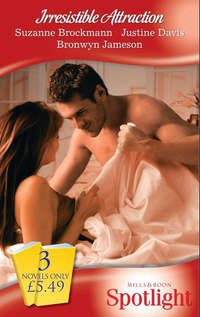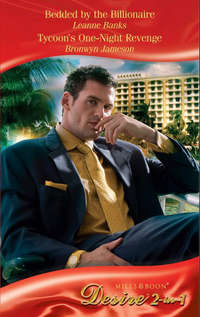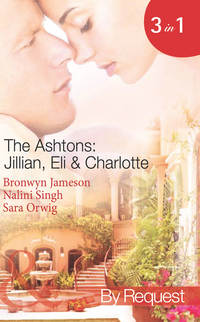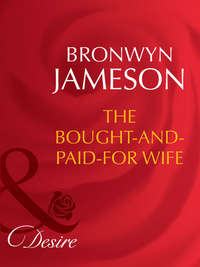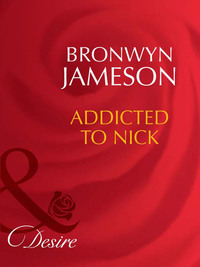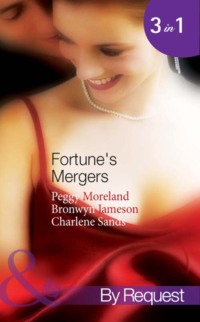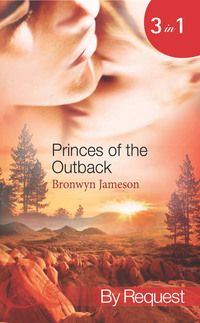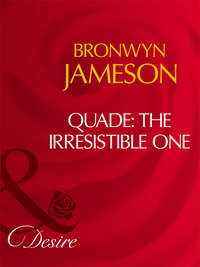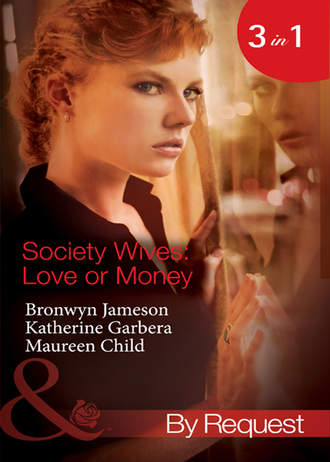
Полная версия
Society Wives: Love or Money: The Bought-and-Paid-for Wife
And she hated that she’d frozen when she should have told them the reason for her mysterious behavior.
The sea of summer frocks and lightweight suits, of hats and champagne flutes and imported longneck beers shifted again, parting as if by a divine hand to reveal him again. Walking toward her, a bottle of vintage Veuve Clicquot in one hand, a pair of flutes in the other. Dressed simply in a pale gray suit and open-necked white shirt—no more, no less than a hundred other men in the crowd—he commanded attention with his size, his presence, the way he moved with an athlete’s grace and purpose.
She felt a burst of sensation, as though the pop of a champagne cork had sent all the bubbles fizzing through her veins.
Not good, Vanessa. Not good at all.
In a bid to appear involved, she turned back to Felicity and Reed, Emma and Garrett, Jack and Lily … and discovered that while she’d been lost in introspection they’d moved on. Vaguely she recalled Lily wanting to sit down. Or Jack insisting she sit. Possibly she’d waved them on.
Now she was alone. And feigning surprise when she heard the rich drawl of Tristan’s voice at her back. His actual words were swallowed by the thumping of her heart as she swung around.
He stood close enough for her to feel the impact of his electric blue gaze. A thousand watts all plugged in to her. He probably bought the whole wow-where-did-you-spring-from act because her mouth had gone slack and her throat tight and breathless while she just stood there staring up at him.
Help, her pragmatic self whimpered weakly. She feared that side of her was about to go down for the count.
“I noticed your lack of champagne.” The corner of his mouth quirked in a kind of crooked half smile. “I gather that’s a transgression here.”
The only transgression she could think of was her weak-kneed, weak-willed desire for a man she’d declared her enemy five days ago. How could this be happening?
That deadly attractive half smile had turned quizzical and Vanessa gave herself a mental shake. “Thank you,” she said, a trifle huskily. “But no.”
“This bottle is straight from Liz Kramer’s stash, just opened, unspiked. Scout’s honor.”
“So you say, but you don’t look like a Boy Scout. Can I trust your word?”
Something flickered in his eyes and in her blood. Perhaps that was the last gurgle of Ms. Pragmatist going under, because she appeared to be flirting with him. She, Vanessa Kotzur Thorpe, who had never flirted in her life.
He filled one of the slender glasses, then handed her the bottle. She regarded it suspiciously. “Take it,” he said. “So I can defend my Boy Scout honor.”
Their fingers brushed as she took the bottle, a thrilling little contact of skin on skin. She had barely recovered when he lifted the glass to his mouth. Their eyes met over the rim as he took a long, slow sip and the connection somehow seemed steeped in intimacy.
Without breaking eye contact, without saying a word, he held out the glass and temptation whispered through her blood. She wanted to take it from his hand, to place her lips on the same spot, to taste his heat on the icy cool glass.
More, she wanted to stretch on her toes and lick the golden chill from his lips. To kiss him the way she’d wanted to the first time.
“You still don’t trust me?”
Vanessa wet her lips. “It’s not that. I’m not drinking.”
“Driving?”
“I don’t drink.” She volunteered the information without thought … and then kicked herself sharply. Pay attention. She didn’t want to explain why she never touched alcohol, nor did she want to see in his eyes that he’d worked out the reason by snooping into her background.
She switched her gaze to the game, pretending to watch without seeing anything but a blur of activity. A team of monkeys mounted on camels could have taken to the field and she wouldn’t have noticed … although she supposed they’d have needed extra-long-handled mallets.
After a moment the thick ache in her chest reminded her to relax and breathe. Today Tristan appeared relaxed, as if he were enjoying this as a social occasion rather than as an investigative opportunity. Perhaps he’d taken her appeal outside the Marabella to heart.
Perhaps he was biding his time.
Play thundered by close to the sideline and the air thickened with the scent of sweat and earth and the clash of contact between players. Vanessa blinked and focused. The umpire blew a foul eliciting a heated debate on who’d crossed whose line on the ball.
“How are you enjoying the polo?” she asked, genuinely curious.
“I like the game.”
“But not the rest?”
He considered that a long moment, appearing to give it more weight than the casual inquiry commanded. “I’m enjoying today more than I’d thought. I hadn’t realized so many people would remember me or want to know me. Given your popularity, I thought I might be the pariah.”
“You’re not?”
His small smile caused a large clamor in her system. “Can’t say I haven’t felt some coolness.”
“Which hasn’t dulled the curiosity.”
“No.”
Vanessa cast a glance over the crowd and found a degree of that curiousity trained on them. Many of the locals—her friends included—would be conjecturing over her chumminess with the enemy. A frown pulled at her brow so she considered the changed dynamic between them. She couldn’t work out what had changed. The heat, the awareness, the attraction, she’d felt before, but today there was another element she couldn’t pin down.
They weren’t exactly comfortable and relaxed together but the tension had altered.
It reminded her of the one time she’d sat on a horse. The riding lessons were a birthday present from Stuart, but when the instructor hoisted her into the saddle she hadn’t enjoyed the sensation one little bit. She’d hated losing touch with earth, of not knowing if the exhilaration would last or bring her crashing onto her backside.
She cast a cautious sideways glance at Tristan and caught him watching her. A weird sense of yearning fluttered to life in her chest, and her frown deepened as she quickly looked away. Oh yes, Ms. Pragmatist nodded. You are so going to land on your backside.
“Worried about what they’re thinking?” he asked.
“Well, I am fraternizing with the enemy.”
“I’m not the enemy, Vanessa.” He eyes on hers were darkly serious. “Your real enemy is the person who wrote that letter.”
Vanessa lost Tristan to Delia during the halftime divot-stomp and didn’t see him again—no, that wasn’t true, she couldn’t help seeing him, but she didn’t talk to him again—until she was walking toward her car at the end of the day. This time her wow-where-did-you-spring -from reaction wasn’t contrived. One second she was picking her way carefully across a soggy patch of ground, trying not to identify the heavy weight pressing down on her chest as going-home-alone gloom, the next he was there at her side.
The weight lifted leaving her feeling ridiculously pleased … until she felt his gaze fix on her smile for an unnervingly long moment. Then she thought, must stop grinning like a loon. Must think of something to say that doesn’t sound like I’m ridiculously, pleased.
“Did you enjoy the second half?” she asked, getting the smile under control. “I lost you during the break.”
“I didn’t know they really did that.”
“Walk the divots? It’s a time-honored tradition and the perfect chance to mix. Don’t they do that at your Aussie football games?”
“Our mixer tradition is aimed at the kids. They all flock onto the ground for a kick at halftime.”
Picturing the mayhem of hundreds of kids let lose on a football field, Vanessa allowed herself a half smile. “Slightly wilder and noisier than a divot-stomp, I imagine.”
“Slightly.”
“You looked as if you were enjoying yourself.” Straight away she wished she’d kept that observation to herself. She also wished that the sight of Delia hanging off his arm, laughing, reaching up to brush something—or nothing—from his collar wasn’t stuck in her visual memory. She had no hold on him and no right to the sharp stab of possessiveness.
“I enjoyed today,” he said noncommittally.
“You seemed to fit right in.”
He cut her a sideways look, as though trying to work out if she was having him on. Then something shifted in his expression, his gaze grew keen with perception. “And you, Vanessa. You fit in as if you were born to this life.”
The warm glow of enjoyment brought on by his seeking her out and fanned by their banter, faded and died. But she might as well confirm what he’d probably already gleaned from Gloria or who knows where else. “My parents both worked for people like these, in the city. I spent some time observing the life.”
“And you dreamed of living it?”
She shrugged. “What girl doesn’t dream? It’s the Cinderella fantasy.”
They stopped beside her car, the last left in this row of the parking field, and she was searching her purse for her keys when he asked, “Why my father?”
Vanessa looked up sharply, not quite sure she’d heard him correctly. If she had, then she didn’t understand the question. Intense blue eyes collided with hers for a heart-jolting moment before he looked away.
Before he waved a hand at the field still littered with Bentleys and Porsches and Mercedes. “You wanted this life, you could have had it with any man you wanted. Why my father?”
For a second she stared back at him, stunned by the question and then by its subtext. She’d set out to trap a rich man because of a childhood Cinderella fantasy. Then she kicked herself hard for her stupidity.
She’d known he held that opinion right from the first time she spoke to him, so why should the question shock her now?
“I hope to God I’m reading you wrong,” she said tightly, “and that you’re not suggesting I could have done better than Stuart.”
“Not better. Younger.”
“Because a younger man could have given me what?” She huffed out a contemptuous breath. “For the life of me I cannot think of any man—younger, older, whatever—as kind and generous and concerned for others as Stuart Thorpe.”
“What about your other needs, Vanessa?”
His meaning was clear in the dark burning light in his eyes, in the way he closed down the distance between them, in the sexual energy that seemed to pulse in the air as his gaze trailed slowly over her face and lingered on her mouth.
She shook her head slowly. This part of her marriage she discussed with no one. Not Gloria, not Andy, not Emma or Lily or any of her girlfriends. She’d promised to keep the platonic nature of their relationship a secret, to protect Stuart’s pride as a man and to prevent the scuttlebutt of gossip.
“You’re young,” he persisted. “Didn’t you want a family?”
“No.”
It wasn’t a lie, despite her recent pangs of baby envy. She’d already brought up her brother, taking over his care when she was little more than a child herself. She’d used up all her nurturing spirit. She had no emotional energy left for babies of her own. None whatsoever.
“No,” she repeated, more adamantly. “I didn’t want a family and I didn’t need a lover. Your father gave me everything I wanted, everything I ever dreamed of wanting, and more. And he chose to leave his estate to me. Why can’t you accept those truths? Why can’t you go back to Australia and let me be?”
Seven
Go home to Australia and let her be?
No, Tristan couldn’t do that. He could never quit a task half-done.
He still needed to know everything about Vanessa, but before he even approached her in the parking lot after the polo match he’d accepted that his motivation had shifted focus.
That’s what drove him to ask why she’d chosen his father.
Frustration. Self-defense. Finding that full-bodied smile trained on him for the very first time, he’d felt a primal rush of possessiveness, a she-should-be-mine kick that transcended desire. He’d needed a reminder, damn fast, of why he couldn’t get in that car and drive her back to his hotel and claim her as his own.
Her fervent response had done the trick. It had also convinced him of one of two things: either Vanessa had genuinely cared for her husband or she was one bloody fine actress.
And if he was out-of-the-ballpark wrong about her relationship with his father, was he wrong about other things?
Questions and conflicting answers chased through his mind all night long. At dawn he plunged his restless body into the hotel pool and slugged out a hundred laps. Afterward he’d intended returning to his suite and to his regular, controllable Monday morning of work, where questions had answers, where decisions triggered action, where results ensued.
Where he never backed down from the tough issues … or from digging too deeply because of a woman’s heartfelt appeal. I’m asking that you respect the privacy of others. Think about it, please. Think about doing the right thing.
That plea still had his conscience tied in knots a week later.
Instead of working, he found himself driving out of town and into the sprawling midcountry estates, heading for White Birch Lane and a score of knotted intangibles. He needed facts. He needed truths.
Not only about Vanessa, but about the father he’d not spoken to since he left Eastwick as a twelve-year-old.
Focused on that result, he didn’t consider the early hour until he was driving up to the closed and silent mansion. It was too early for her to be gone for the day but not too early, he discovered, to find her in the garden.
The morning sun was less than an hour old, its light as pale as her hair. As diaphanous as the shell-pink sweep of nothing that shaped her body. The image was soft and ethereal, an artist’s rendition of Girl with Flowers, and Tristan stood transfixed by her beauty for a minute too long. Twenty yards of lawn and several bays of massed rose bushes away, he sensed her sudden stillness and the shock in her eyes when his presence registered.
The polite thing to do was acknowledge her, maybe with a teasing remark about wandering the grounds in her negligée, then retreat so she could dress in something more … substantial. The sensible thing was to turn on his heel and get the hell out of there without taking any more notice about what she was wearing or not wearing.
But he had noticed. His body ached with its impolite and not-sensible response to noticing.
The best he could do was keep a bed of rose bushes between them as he approached, an extra thorny-branched barrier to the one he was busy erecting in his mind.
She’s out of bounds. She loved your father. She was his wife for five years.
No matter what resulted from their legal wrangle, from the letter’s allegations, from his investigations, she could never be his.
The massed shrubs shielded much of her body from view, but it didn’t help. He could still see her face, her throat, the skin framed by lace at her shoulders and breasts. And he could see what had brought her out of doors so early.
One of her gloved hands held a bunch of long-stemmed blooms; the other wielded a pair of lethal-looking shears. The part of his body that had noticed the diaphanous nightdress and the shape of her body beneath took due note.
“I hope I didn’t startle you too much. Those things—” he inclined his head to indicate the shears “—look like they could do serious damage.”
“I heard you drive up, so no.”
“Yet you looked surprised.”
“I thought you were Gloria, arriving early.”
Her accompanying shrug caused her negligee’s deep neckline to dip, and Tristan’s hand itched to reach out and slide it back into place. With a silent curse he shoved both hands in his pockets, out of temptation’s way. “I’m not Gloria.”
“No,” she said, as soft as the morning. “You’re not.”
Their gazes meshed for what felt like a long time. He could feel the pulse of attraction between them, a silent energy that hummed in the summer’s morning. She felt it too—he could see it in her eyes and in the slight flush of her cheeks.
Hell. She felt it too.
He buried his hands deeper in his shorts. “I should have called first.”
“It’s fine, really.”
“Really?”
“You saved me a phone call.” A frown of concentration formed between her brows and turned her eyes serious. “I wanted to talk to you about what I said yesterday … or what I didn’t say.”
“About?”
“Your father. The will. I’m not backing down on anything I said, but on my way home yesterday and last night and this morning I was thinking—” She paused and although her eyes were clear, the dark smudges beneath flagged her lack of sleep. “I may have given the impression that Stuart didn’t want you to have anything. That is not true.”
“He left me a thousand bucks. To show he hadn’t forgotten me.”
“That was the lawyers’ doing and not what I meant. He would have made you a beneficiary, Tristan, if you’d come to see him when he asked.”
“Guess I must have missed that.”
“I guess so,” she said with a damn-you note to her voice. With great care she snipped off another pink bud and added it to her collection. The petals quavered—because her hands were shaking?—and when she looked up again, her eyes glistened with moisture. “Ignoring his letter, not even bothering to reply—that was just plain cruel, Tristan. He was your father and he was dying. Would it have hurt to swallow your pride and pick up the phone?”
Hit hard by the husky edge to her voice and the sheen of emotion in her eyes, it took a moment for the words and the message to register. Then everything inside him went still. “What letter?”
“He wanted to see you or at least to speak to you, to explain his side of the story. I suggested he write—that he might find that easier than trying to explain over the phone.”
“And he sent it?”
“I posted it myself.” She stared back at him, at first with that same hard edge as earlier and then with slowly dawning comprehension. “You really didn’t receive it, did you? And when I tried to call …”
He’d deliberately stonewalled her, not taking the calls and then not returning her increasingly insistent messages until it was too late. His father had passed away an hour before.
What-might-have-been frustration swelled inside him, tightening his chest, his throat, his expression. “If he wanted to talk to me so badly, why the hell did he leave it so late?”
“Because he was as proud and as stubborn as you! He poured his heart and his soul into that letter and when you didn’t reply, when he got nothing but stony silence, he gave up.”
“But you didn’t.”
In her eyes, he saw that truth. She’d pushed Stuart to write the letter. And she’d made those calls when his father was hospitalized, a last ditch effort to reconcile them: the husband she’d loved and his only child.
“That’s when he made up his mind about the will.” Carefully she closed the shears and clicked the safety lock into place. The metallic snick punctuated the finality of his father’s decision. Closed, done, ended. “He said you’d made your own life in Australia. You were a success. You didn’t need his money and you didn’t need him.”
She was right. At thirty his time of needing a father had long passed into a faded, bitter memory of the years when he’d silently yearned for that support. Even if he had read the letter or if he’d taken her calls, he doubted it would have led to anything but cold, hard words. “Too little, too late.”
For a moment he thought she might dispute that, but then she changed tack—he saw the switch in her expression and the set of her mouth as she gathered up her bunch of cut roses and started to move off. “You might not believe this,” she said, “but he never forgot you were his son. He told me once how glad he was that your football career took off, because that made it so easy to keep up the connection. The more your star rose, the more stories he found in the press.”
“His son, the famous footballer.”
A vehement spark lit her eyes. “It wasn’t like that, Tristan! Of course he was proud of your success—what parent wouldn’t be? But this was about knowing some part of you, about having that connection. He learned all about your Aussie Rules game and he read all the match reports and stats. He watched the games on cable.
“One night I found him sitting in the dark, in the theater room where he watched the games. And the television was showing, I don’t know, ice-skating or rhythmic gymnastics or something I knew he wouldn’t watch. I thought he’d gone to sleep so I turned on the light to rouse him and send him back to bed.”
She paused in a gap between two heavily-laden bushes, her expression as soft as the mass of creamy-pink roses that framed her slender curves. And, damn it her eyes had gone all dewy again. He braced himself, against the punch-to-the-heart sensation the sight of her caused and against whatever she was about to tell him.
“He didn’t turn around because he didn’t want me to see his tears, but I heard them in his voice. I knew he was sitting there in the dark crying. He told me later that you’d been playing your two hundredth game and they’d run a special on you during the halftime break. He was so proud and I was so damn mad at you both for not doing something about your rift.”
Rift? The gap between him and his father had been more in the scope of a canyon. If there’d ever been any chance of bridging it … “That was up to him.”
“Would you have listened?”
For several seconds they stood, gazes locked, the atmosphere taut with that one telling question. And when he didn’t answer, she shook her head sadly. “I didn’t think so.”
“It makes no difference.”
“You’re that callous?”
“I am what I am.”
She nodded slowly. And the disappointment in her eyes hit him like a full-throttle shoulder charge. “You are also more like your father than you know.”
“Kind. Generous. Concerned,” he quoted back at her.
“Proud. Stubborn. Unprepared to step back from your line in the sand.” Her eyes narrowed with a mixture of challenge and speculation. “Why is the inheritance so important to you? Your success at football carried on into business. You just sold your company, advantageously, I gather. You can’t need the money.”
“Money isn’t everything, duchess.”
“Is it the house you want?” she persisted, ignoring his gibe. “Does it have special meaning?”
“Not any more. Does it to you?”
“It meant a lot to Stuart, so, yes.”
“I’m asking about you.” And even as he asked the question, he felt its significance tighten in his chest. “Is this your idea of home, Vanessa?”
“It’s the only place I’ve ever felt happy to call home.”
“You’re happy here, living this life?”
She looked him square in the eye. “Yes, I am. I work hard on fund-raising committees. I love the volunteering work I do.”
“A regular philanthropist, are you?”
It was a cheap shot but she took it on the chin without flinching. He sensed, in the briefest of pauses before she responded, that she’d taken a lot of hits in her life. That she was a lot less delicate than she looked. “I do what I can. And just so there are no misconceptions—I like most everything about my life. I like the security of money, of knowing all my needs are taken care of.”
“Not to mention the things that money can buy.”
“I don’t care about the things.”
Really? “You told me you love your car. Your clothes aren’t from Wal-Mart. And what about the trinkets?” Forgetting the self-defensive caution that had driven him to keep a garden’s width between them, he rounded the end of the bay and closed down that separation. “If things don’t matter, then why were you so upset when the figurine smashed?”
“It was a gift.”
“From Stuart?”
A shadow flitted across her expression but her gaze remained clear and unwavering and disarmingly honest.


